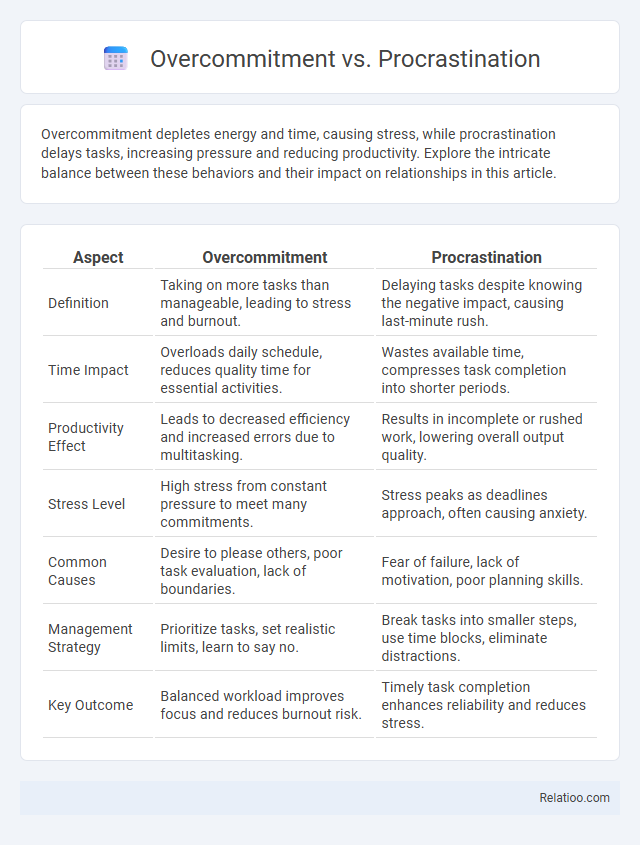Overcommitment depletes energy and time, causing stress, while procrastination delays tasks, increasing pressure and reducing productivity. Explore the intricate balance between these behaviors and their impact on relationships in this article.
Table of Comparison
| Aspect | Overcommitment | Procrastination |
|---|---|---|
| Definition | Taking on more tasks than manageable, leading to stress and burnout. | Delaying tasks despite knowing the negative impact, causing last-minute rush. |
| Time Impact | Overloads daily schedule, reduces quality time for essential activities. | Wastes available time, compresses task completion into shorter periods. |
| Productivity Effect | Leads to decreased efficiency and increased errors due to multitasking. | Results in incomplete or rushed work, lowering overall output quality. |
| Stress Level | High stress from constant pressure to meet many commitments. | Stress peaks as deadlines approach, often causing anxiety. |
| Common Causes | Desire to please others, poor task evaluation, lack of boundaries. | Fear of failure, lack of motivation, poor planning skills. |
| Management Strategy | Prioritize tasks, set realistic limits, learn to say no. | Break tasks into smaller steps, use time blocks, eliminate distractions. |
| Key Outcome | Balanced workload improves focus and reduces burnout risk. | Timely task completion enhances reliability and reduces stress. |
Understanding Overcommitment: Definition and Causes
Overcommitment involves taking on more responsibilities than one can realistically manage, often driven by a desire to please others or fear of missing opportunities. This behavior leads to stress, burnout, and decreased productivity due to overwhelming demands on time and energy. Understanding overcommitment requires recognizing its root causes, including perfectionism, poor time management, and difficulty setting boundaries.
Procrastination Explained: What Drives Delay?
Procrastination arises from a mix of psychological factors such as fear of failure, perfectionism, and lack of motivation, which trigger avoidance behavior despite negative consequences. It differs from overcommitment, where excessive obligations cause overwhelm, and overscheduling, which leads to insufficient focus time. Understanding the underlying causes of procrastination enables targeted strategies like time management, goal setting, and cognitive restructuring to overcome delay and improve productivity.
Psychological Roots: Why We Overcommit or Procrastinate
Overcommitment often stems from a deep-rooted fear of missing out or a desire for approval, driven by anxiety and perfectionism, while procrastination is closely linked to fear of failure and task aversion, causing delayed action despite knowing the consequences. Both behaviors are influenced by underlying cognitive distortions and emotional regulation issues that hinder effective decision-making and time management. Understanding these psychological roots allows for targeted strategies to balance commitments and enhance productivity without overwhelming stress.
Recognizing the Signs of Overcommitment
Recognizing the signs of overcommitment involves identifying chronic stress, decreased productivity, and frequently missed deadlines due to an overwhelming number of responsibilities. Unlike procrastination, which is characterized by delaying tasks, overcommitment leads to burnout and exhaustion from taking on too many obligations simultaneously. Understanding these symptoms helps individuals prioritize tasks effectively and maintain a balanced workload.
Spotting Procrastination Patterns in Daily Life
Spotting procrastination patterns in daily life involves recognizing repeated delays in task initiation despite knowing the negative consequences. Distinguishing procrastination from overcommitment requires attention to motivational factors and task prioritization; procrastinators often avoid tasks due to fear or lack of interest, while overcommitted individuals struggle with excessive responsibilities. Identifying habitual distractions, setting clear deadlines, and monitoring task completion times can help detect procrastination tendencies and improve time management strategies.
Overcommitment vs Procrastination: The Key Differences
Overcommitment involves saying yes to too many tasks, leading to overwhelming stress and reduced productivity, while procrastination is the habitual delay of tasks despite knowing the negative consequences. You can identify overcommitment by poor time management and constant exhaustion, whereas procrastination is marked by avoidance and prioritizing short-term comfort over long-term goals. Understanding these key differences helps in developing strategies to manage your workload effectively and improve overall efficiency.
Impacts on Productivity and Mental Health
Overcommitment leads to chronic stress and burnout by overwhelming Your capacity to manage tasks, while procrastination causes delays and increased anxiety from unfinished work. Both behaviors disrupt productivity, with overcommitment reducing focus and efficiency, and procrastination creating last-minute pressure that compromises quality. Balancing task load and time management is crucial to protect mental health and maintain consistent productivity levels.
Strategies to Balance Commitments Effectively
Balancing commitments effectively involves prioritizing tasks based on urgency and importance, using time-blocking techniques to allocate dedicated periods for work and rest, and setting realistic goals to avoid the pitfalls of overcommitment and procrastination. Implementing regular review sessions helps identify overload early, enabling timely adjustment of commitments to maintain productivity and well-being. Leveraging tools like digital planners and reminder apps supports consistent progress tracking and reduces the tendency to delay or accept excessive obligations.
Tips to Overcome Procrastination Habits
Overcommitment drains your energy, while procrastination stalls your progress, both disrupting productivity and increasing stress. To overcome procrastination habits, prioritize tasks using the Eisenhower Matrix, set clear deadlines, and break projects into smaller, manageable steps to maintain focus and motivation. Utilize time-blocking techniques and eliminate distractions to create a structured environment that fosters consistent task completion.
Choosing Sustainable Success: Finding Your Optimal Pace
Overcommitment leads to burnout by stretching resources thin, while procrastination delays progress and increases stress, both undermining sustainable success. Finding your optimal pace requires balancing ambition with realistic workload management and prioritizing tasks to maintain consistent productivity. Sustainable success emerges from setting achievable goals, managing time effectively, and recognizing personal limits to avoid the pitfalls of overcommitment and procrastination.

Infographic: Overcommitment vs Procrastination
 relatioo.com
relatioo.com